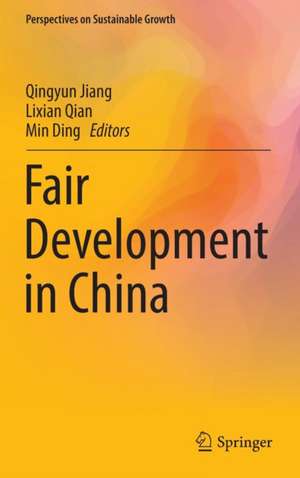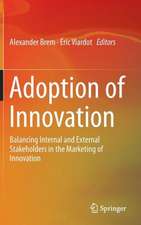Fair Development in China: Perspectives on Sustainable Growth
Editat de Qingyun Jiang, Lixian Qian, Min Dingen Limba Engleză Hardback – 11 oct 2016
Fair development is a framework that includes such principles as sustainability, with particular respect to the implications for human development in the context of available opportunities, resources, and outputs. China, the world’s second largest economy, continues to face several challenges when pursuing sustainable development, suchas unbalanced growth pressure in the central and western regions and rural areas of China, the fragility of the natural environment, and resource constraints and structural problems in economic and social development. It is a crucial mission for China to sustain economic growth without sacrificing environmental sustainability or human rights. For example, there is increasing pressure on China to reduce its dependence on fossil energy. Therefore, innovations in technologies, management, and even systems are critical to drive a transition to low-carbon energy, which will be a long-term process.
Featuring contributions from a diverse group of researchers from multiple disciplines, this volume provides a comprehensive collection of perspectives on economic, political, and social development in China.
| Toate formatele și edițiile | Preț | Express |
|---|---|---|
| Paperback (1) | 640.24 lei 6-8 săpt. | |
| Springer International Publishing – 8 iun 2018 | 640.24 lei 6-8 săpt. | |
| Hardback (1) | 646.62 lei 6-8 săpt. | |
| Springer International Publishing – 11 oct 2016 | 646.62 lei 6-8 săpt. |
Preț: 646.62 lei
Preț vechi: 760.73 lei
-15% Nou
Puncte Express: 970
Preț estimativ în valută:
123.75€ • 128.72$ • 102.16£
123.75€ • 128.72$ • 102.16£
Carte tipărită la comandă
Livrare economică 14-28 aprilie
Preluare comenzi: 021 569.72.76
Specificații
ISBN-13: 9783319436616
ISBN-10: 3319436619
Pagini: 340
Ilustrații: VIII, 284 p. 9 illus., 5 illus. in color.
Dimensiuni: 155 x 235 x 18 mm
Greutate: 0.59 kg
Ediția:1st ed. 2017
Editura: Springer International Publishing
Colecția Springer
Seria Perspectives on Sustainable Growth
Locul publicării:Cham, Switzerland
ISBN-10: 3319436619
Pagini: 340
Ilustrații: VIII, 284 p. 9 illus., 5 illus. in color.
Dimensiuni: 155 x 235 x 18 mm
Greutate: 0.59 kg
Ediția:1st ed. 2017
Editura: Springer International Publishing
Colecția Springer
Seria Perspectives on Sustainable Growth
Locul publicării:Cham, Switzerland
Cuprins
Section I Overview.- Ch 1 From Equality to Fairness.- Ch 2 Four-wheel Driven Governance.- Section II Individual Perspective.- Ch 3 Fair Values and Social Psychology Construction.- Ch 4 Family Life Style and Individual Circle.- Ch 5 Civil Needs and Fair Development.- Ch 6 Co-creating Ecological Values, Green Index for Individuals and Families.- Section III Organizational Perspective.- Ch 7 Corporate Social Responsibility.- Ch 8 Fairness-oriented Green Marketing.- Ch 9 Social Enterprises.- Ch 10 Interaction between Firms and Consumers.- Ch 11 Fairness Governance and Action in Inter-firm Organizations.- Section IV Government Perspective.- Ch 12 Governance and Transparency.- Ch 13 Balance Equity and Efficiency in Economic and Social Plan.- Ch 14 Public Investment.- Ch 15 Move from Manufacturing to Services, from Materialism to Virtual Consumption.- Section V Social Perspective.- Ch 16 Social Structure and Interactivities of Social Classes.- Ch 17 Fairness and Social Evolution.- Ch 18 Virtual Social Network.- Ch 19 Social Welfare.- Section VI Internationalization of Fair Development.- Ch 20 International Influences on Fair Development in China.- Ch 21 Fairness of Chinese Firms in Global Market.- Ch 22 Fairness of MNCs in China.- Section VII Conclusion.- Ch 23 Measure Fair development.- Ch 24 Balance Current and Future Social Development in Multi-Dimensions.- Ch 25 Fair Development Framework for Actions.
Textul de pe ultima copertă
The purpose of this volume is to explore sustainable innovation and “fair development” in China. It examines various existing problems currently faced in China, such as food safety, education, healthcare, employment, housing, the environment and censorship, among others, and provides different perspectives in relation to fair development. Topics covered include coordinated governance, energy consumption and policy, dynamic sustainability, green marketing, and people-oriented education. While the focus of the volume is on China, the research process and structure presented can also be used to explore fair development in other emerging economies.
Fair development is a framework that includes such principles as sustainability, with particular respect to the implications for human development in the context of available opportunities, resources, and outputs. China, the world’s second largest economy, continues to face several challenges when pursuing sustainable development, such asunbalanced growth pressure in the central and western regions and rural areas of China, the fragility of the natural environment, and resource constraints and structural problems in economic and social development. It is a crucial mission for China to sustain economic growth without sacrificing environmental sustainability or human rights. For example, there is increasing pressure on China to reduce its dependence on fossil energy. Therefore, innovations in technologies, management, and even systems are critical to drive a transition to low-carbon energy, which will be a long-term process. Featuring contributions from a diverse group of researchers from multiple disciplines, this volume provides a comprehensive collection of perspectives on economic, political, and social development in China.
Fair development is a framework that includes such principles as sustainability, with particular respect to the implications for human development in the context of available opportunities, resources, and outputs. China, the world’s second largest economy, continues to face several challenges when pursuing sustainable development, such asunbalanced growth pressure in the central and western regions and rural areas of China, the fragility of the natural environment, and resource constraints and structural problems in economic and social development. It is a crucial mission for China to sustain economic growth without sacrificing environmental sustainability or human rights. For example, there is increasing pressure on China to reduce its dependence on fossil energy. Therefore, innovations in technologies, management, and even systems are critical to drive a transition to low-carbon energy, which will be a long-term process. Featuring contributions from a diverse group of researchers from multiple disciplines, this volume provides a comprehensive collection of perspectives on economic, political, and social development in China.
Caracteristici
Comprehensive collection of various perspectives on fair development and sustainable innovation in China Features contributions from a diverse group of researchers from multiple disciplines such as management, marketing, political science, environmental science, and public administration Explores a wide range of topics, including social development, public policy, governance, and environmentally sustainable business practices Includes supplementary material: sn.pub/extras
















